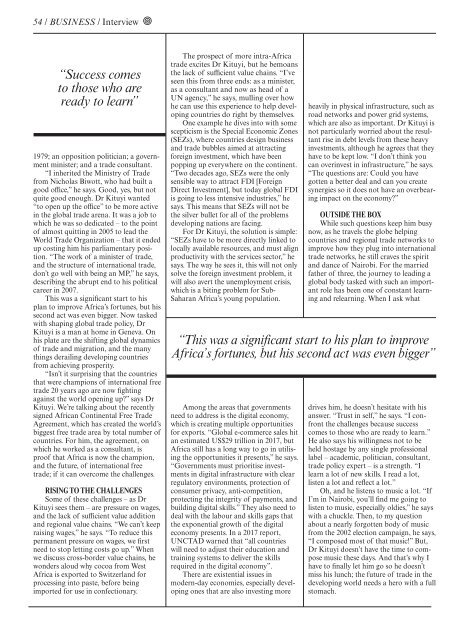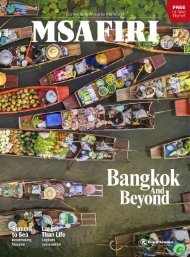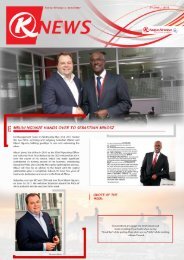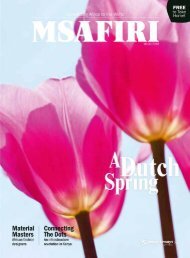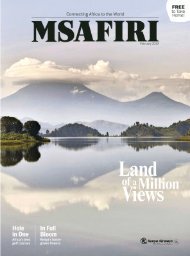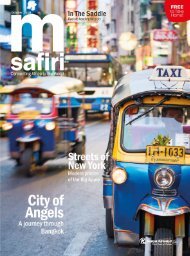You also want an ePaper? Increase the reach of your titles
YUMPU automatically turns print PDFs into web optimized ePapers that Google loves.
54 / BUSINESS / Interview<br />
“Success comes<br />
to those who are<br />
ready to learn”<br />
1979; an opposition politician; a government<br />
minister; and a trade consultant.<br />
“I inherited the Ministry of Trade<br />
from Nicholas Biwott, who had built a<br />
good office,” he says. Good, yes, but not<br />
quite good enough. Dr Kituyi wanted<br />
“to open up the office” to be more active<br />
in the global trade arena. It was a job to<br />
which he was so dedicated – to the point<br />
of almost quitting in 2005 to lead the<br />
World Trade Organization – that it ended<br />
up costing him his parliamentary position.<br />
“The work of a minister of trade,<br />
and the structure of international trade,<br />
don’t go well with being an MP,” he says,<br />
describing the abrupt end to his political<br />
career in 2007.<br />
This was a significant start to his<br />
plan to improve Africa’s fortunes, but his<br />
second act was even bigger. Now tasked<br />
with shaping global trade policy, Dr<br />
Kituyi is a man at home in Geneva. On<br />
his plate are the shifting global dynamics<br />
of trade and migration, and the many<br />
things derailing developing countries<br />
from achieving prosperity.<br />
“Isn’t it surprising that the countries<br />
that were champions of international free<br />
trade 20 years ago are now fighting<br />
against the world opening up?” says Dr<br />
Kituyi. We’re talking about the recently<br />
signed African Continental Free Trade<br />
Agreement, which has created the world’s<br />
biggest free trade area by total number of<br />
countries. For him, the agreement, on<br />
which he worked as a consultant, is<br />
proof that Africa is now the champion,<br />
and the future, of international free<br />
trade; if it can overcome the challenges.<br />
RISING TO THE CHALLENGES<br />
Some of these challenges – as Dr<br />
Kituyi sees them – are pressure on wages,<br />
and the lack of sufficient value addition<br />
and regional value chains. “We can’t keep<br />
raising wages,” he says. “To reduce this<br />
permanent pressure on wages, we first<br />
need to stop letting costs go up.” When<br />
we discuss cross-border value chains, he<br />
wonders aloud why cocoa from West<br />
Africa is exported to Switzerland for<br />
processing into paste, before being<br />
imported for use in confectionary.<br />
The prospect of more intra-Africa<br />
trade excites Dr Kituyi, but he bemoans<br />
the lack of sufficient value chains. “I’ve<br />
seen this from three ends: as a minister,<br />
as a consultant and now as head of a<br />
UN agency,” he says, mulling over how<br />
he can use this experience to help developing<br />
countries do right by themselves.<br />
One example he dives into with some<br />
scepticism is the Special Economic Zones<br />
(SEZs), where countries design business<br />
and trade bubbles aimed at attracting<br />
foreign investment, which have been<br />
popping up everywhere on the continent.<br />
“Two decades ago, SEZs were the only<br />
sensible way to attract FDI [Foreign<br />
Direct Investment], but today global FDI<br />
is going to less intensive industries,” he<br />
says. This means that SEZs will not be<br />
the silver bullet for all of the problems<br />
developing nations are facing.<br />
For Dr Kituyi, the solution is simple:<br />
“SEZs have to be more directly linked to<br />
locally available resources, and must align<br />
productivity with the services sector,” he<br />
says. The way he sees it, this will not only<br />
solve the foreign investment problem, it<br />
will also avert the unemployment crisis,<br />
which is a biting problem for Sub-<br />
Saharan Africa’s young population.<br />
heavily in physical infrastructure, such as<br />
road networks and power grid systems,<br />
which are also as important. Dr Kituyi is<br />
not particularly worried about the resultant<br />
rise in debt levels from these heavy<br />
investments, although he agrees that they<br />
have to be kept low. “I don’t think you<br />
can overinvest in infrastructure,” he says.<br />
“The questions are: Could you have<br />
gotten a better deal and can you create<br />
synergies so it does not have an overbearing<br />
impact on the economy?”<br />
OUTSIDE THE BOX<br />
While such questions keep him busy<br />
now, as he travels the globe helping<br />
countries and regional trade networks to<br />
improve how they plug into international<br />
trade networks, he still craves the spirit<br />
and dance of Nairobi. For the married<br />
father of three, the journey to leading a<br />
global body tasked with such an important<br />
role has been one of constant learning<br />
and relearning. When I ask what<br />
“This was a significant start to his plan to improve<br />
Africa’s fortunes, but his second act was even bigger”<br />
Among the areas that governments<br />
need to address is the digital economy,<br />
which is creating multiple opportunities<br />
for exports. “Global e-commerce sales hit<br />
an estimated US$29 trillion in 2017, but<br />
Africa still has a long way to go in utilising<br />
the opportunities it presents,” he says.<br />
“Governments must prioritise investments<br />
in digital infrastructure with clear<br />
regulatory environments, protection of<br />
consumer privacy, anti-competition,<br />
protecting the integrity of payments, and<br />
building digital skills.” They also need to<br />
deal with the labour and skills gaps that<br />
the exponential growth of the digital<br />
economy presents. In a 2017 report,<br />
UNCTAD warned that “all countries<br />
will need to adjust their education and<br />
training systems to deliver the skills<br />
required in the digital economy”.<br />
There are existential issues in<br />
modern-day economies, especially developing<br />
ones that are also investing more<br />
drives him, he doesn’t hesitate with his<br />
answer. “Trust in self,” he says. “I confront<br />
the challenges because success<br />
comes to those who are ready to learn.”<br />
He also says his willingness not to be<br />
held hostage by any single professional<br />
label – academic, politician, consultant,<br />
trade policy expert – is a strength. “I<br />
learn a lot of new skills. I read a lot,<br />
listen a lot and reflect a lot.”<br />
Oh, and he listens to music a lot. “If<br />
I’m in Nairobi, you’ll find me going to<br />
listen to music, especially oldies,” he says<br />
with a chuckle. Then, to my question<br />
about a nearly forgotten body of music<br />
from the 2002 election campaign, he says,<br />
“I composed most of that music!” But,<br />
Dr Kituyi doesn’t have the time to compose<br />
music these days. And that’s why I<br />
have to finally let him go so he doesn’t<br />
miss his lunch; the future of trade in the<br />
developing world needs a hero with a full<br />
stomach.


